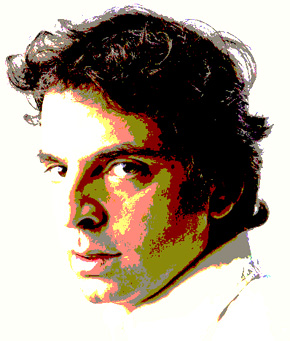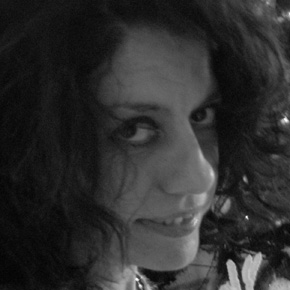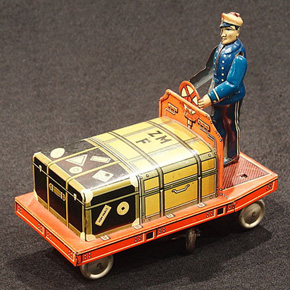Not Etgar Keret
by Nora Nadjarian
Posterised portrait of Etgar Keret, from a photograph by Yanai Yechiel
“We laughed so much we cried,” they said.
The funniest guy ever, they said. You missed a great film, and watching it on DVD will only add to your misery. You missed the chance of a lifetime to visually assess his wife, to admire him, her, him, even from a distance. You could have felt his creative energy go straight to your soul as you shook hands. You could have smiled at him. You could have said: “I’m so happy to be able to tell you this face to face, Etgar: I love you. Oh God, I love you.”
You got the date wrong? They stared at me, aghast. Jesus, you miss a bus. You miss a train. Hell, you may even miss a flight! But no one. Ever. Misses. Etgar. Keret.
So, he came to my home town, talked about his life, screened a film he directed with his wife and left, before I got the chance to even hear his last words to the packed audience – which probably were: “Thank you, thank you, really, truly. I am touched there were so many of you here this evening. I am touched that I have touched you. Your lives will never be the same again.”
And then he signed books and drew odd little pictures in them with his left hand. And he smiled, kind of, and grinned, kind of, and he shook hands, and he smiled some more. Drank a glass of red wine, spilt a little on the floor, stepped on it, talked to a few people, looked at his watch. And left.
My body felt like a missing person for weeks. A limp, transparent lump of nothingness, jellyfished by my own stupidity. (What does jellyfished mean? It means Don’t Cry for Me Argentina, it means fuck the calendar, it means there’s a bee inside your head that wants to escape, it means really, truly, you can’t even read dates, it means you never got a chance, it means you should go and crack a few walnuts with your teeth, it means say something ugly like Krankenstein a few thousand times, smash a few white plates against white walls, kick yourself or ask someone to do it for you, it means a whole load of useless things, pick and choose, two for the price of one, are you happy now?)
Even the supermarket cashier who’s known me for six years (give or take) gave me a sad look and asked, almost apologetically, if I was all right. “Of course I am,” I said, picking up the bag of unripe avocadoes and dropping it back into the trolley, “What makes you ask?” “I dunno,” she said. “You look – different. Kind of – er… lost.” I’ve always thought unripe avocadoes look and feel like old-fashioned hand grenades. Hard and green.
And suddenly I felt I was a character in a story who had only seven or eight minutes to tell the world the story of her life in a monologue, or a rant. “Lost?” I cried. “You think I look lost? I’m not crossing borders and you’re not an immigration officer in a fucking airport! I’m buying avocadoes for Christ’s sake! What do you care what I look like? But just think, there could be a reason for the way somebody looks. There’s a reason for everything. Straighten your back and look around you. We’re all in our own little world here, we’re all a little lost, we’re all hiding something, we’ve all missed out on something, we’re all fucked, right? Spot the ghastly women with the tattooed eyebrows and breast implants whose husbands are screwing East Europeans, spot the schoolgirl who’s two months pregnant and hiding it under a loose T-shirt, spot the gum-chewing bald-headed sonofabitch who screwed his best friend‘s girlfriend last night, spot the bureaucrat and his pickled smile, fat wallet and cancerous cells, the hooligan with crazy, curly hair. Now spot the difference between them and you. And now let me tell you why I look lost. I’ve missed something.”
“That’ll be 9 Euros and 86 cents,” she replied calmly. Maybe she hadn’t heard me.
In the Lost and Found Department at Larnaca Airport they once found the suitcase of a great author. He’d been in such a hurry to leave the island, he left his luggage behind. After it had started gathering dust there for weeks and nobody had claimed it, my friend Nick who is a baggage handler called me to ask if I’d like him to open it slightly and take a peek. “Yes, take a peek,” I said, “but call me while you’re doing it. I want to be there, too.”
One cold Wednesday night in mid-January my mobile rang and half-dressed, half-undressed, I answered it. “Are you ready?” said Nick. “I can’t do this any other time. There’s nobody around. It’s our only chance.” I told him to be quick about it. He said he had to find a way to break the lock. “Try 1967 before you do,” I yawned. It worked. “OK!” I could hear the excitement in his breath, as he lowered the suitcase on the cold ground, sloooooowly started separating the top half from the bottom half like a kind of surgeon and… Nick went silent. Suddenly very silent. “Come on!” I cried, “Tell me what you see. The suspense is killing me…” In the fifty-five seconds that followed I expected him to say something like: “Oh, it’s very boring. Shaving kit, boxer shorts, two long-sleeved white shirts, a brown jumper, a pair of jeans, some tea bags, a couple of flyers with stuff written in Hebrew, a T-shirt with a teddy bear on it which says ‘Every Story has an End’. And some marbles.” Instead, Nick said: “You won’t believe this.” And went quiet. “What?” I yelled. “Won’t believe what? Are you finally gonna tell me what you can see?”
“I can see a jellyfish,” said Nick. “But I think it’s dead.”
I realised after all these years who Stelios, my car mechanic, reminds me of. Same greying, tousled hair, same goofy teeth, same thick lips, same hooked nose… same way of appearing out of nowhere.”
That night, Etgar Keret appeared to me in a dream. At least, he looked like Etgar Keret, so I told him about the suitcase, the dead jellyfish, its shrivelled up body and tentacles, and started crying. “Please don’t cry,” he said, and hugged me. “Women who cry make me uncomfortable. Do not leave your life unattended. Do not waste your tears. And in any case, I am not Etgar Keret.”
Before I could ask who he was, he replied. “I am your car mechanic. Don’t you recognise me?”
Now he mentioned it, it finally clicked. I realised after all these years who Stelios, my car mechanic, reminds me of. Same greying, tousled hair, same goofy teeth, same thick lips, same hooked nose, big, brown, downward slanting eyes and upward shooting eyebrows. Same way of appearing out of nowhere, wearing a leather jacket. “I don’t know anything about jellyfish,” he said. “But let’s take a look at your car.” He smiled, kind of. And grinned, with all the whiteness of his teeth, while he opened the bonnet with great élan, using his left hand. It was as if he was opening up the way to all kinds of possibilities. A full service of my car and great possibilities. “Come back at three. To pick up your car. It’ll be as good as new.”
When I woke up, I wondered if the dream had a hidden meaning. Had I checked the oil? Did the brakes work? And the gearbox? The headlights? Because the brakes kind of whistled sometimes and I had no idea what that meant, and no idea what I’d do if my car broke down in a deserted part of town. Or maybe the car in the dream was symbolic of my heart, or something.
Lately, I’ve been trying to do with people and events in my life what I do with words, sentences and whole documents in front of a computer screen. Delete, edit, discard, drag to and empty from Recycle Bin. The writer in me thinks it is bound to have a therapeutic effect, all this deleting, blanking, blotting out the person or thing I’d rather not remember. It doesn’t always work. In fact, it has the opposite effect. The more I try to delete or forget, the more I remember, the more I want them to shut up, the more the characters talk.
A friend told me a long time ago it has only snowed once in Tel Aviv in the past sixty years. It was his father’s third birthday. His parents took him up to the top of the roof of their house, a little boy dressed in a fur coat, like a cute teddy bear. He showed me a photo of him, them, all huddled up in that whiteness, somewhere in the heart of Tel Aviv. “It’s hard to make out the faces in a black-and-white photograph,” he said, “with all that snow falling.”
I want to end this story with another story which ended some time ago. This is like the final scene in a film. It’s kind of bittersweet. And, actually, it hasn’t got much to do with Etgar Keret – except that the two people in it recommended Keret stories to each other, once upon a time. It’s a scene I play over and over in my head, without ever managing to edit or change anything at all.
There are two people, a man and a woman, on a rooftop in Tel Aviv. It’s snowing for the first time in centuries, and the man asks the woman how she’s doing. Before she can open her mouth he asks her: “Do you remember that night I got stung by a jellyfish?” She smiles and nods. She remembers it more clearly than anything in her life. It stings. No words come out of her mouth. Then he says: “Do you miss me?” She smiles again, but again, not a single word comes out. Her voice is cold, shivering, hiding. And before his voice disappears completely: “Meet me in Cafeneto at Dizengoff Centre at three?” She knows there is no answer. That neither of them has any way of moving or getting there. Because it was all such a long time ago.
At the end of the story the two characters are trapped in a snow globe, and some unknown hand shakes it and turns it upside down, forever and ever. The snow falls into her eyes and everywhere, stings her bare skin, because she’s dressed in a cotton summer dress and because it’s July and because all the quotation marks start falling, too, just like the snow, and who knows who said what and when and why, because everything finally makes perfect sense or no sense at all, just like in a dream.
And now let me tell you why I look lost. I’ve missed something. I am touched that I have touched you. Your life will never be the same again. Do not leave your life unattended. Do not waste your tears. We laughed so much, we cried. And, in any case, I am not Etgar Keret.
 Nora Nadjarian is a poet and short story writer from Cyprus. She has been published internationally online and in print. Her work has been included in Best European Fiction 2011 (Dalkey Archive Press) and the poetry anthology Being Human (Bloodaxe Books, 2011).
Nora Nadjarian is a poet and short story writer from Cyprus. She has been published internationally online and in print. Her work has been included in Best European Fiction 2011 (Dalkey Archive Press) and the poetry anthology Being Human (Bloodaxe Books, 2011).
bettyboopinspired.blogspot.com


